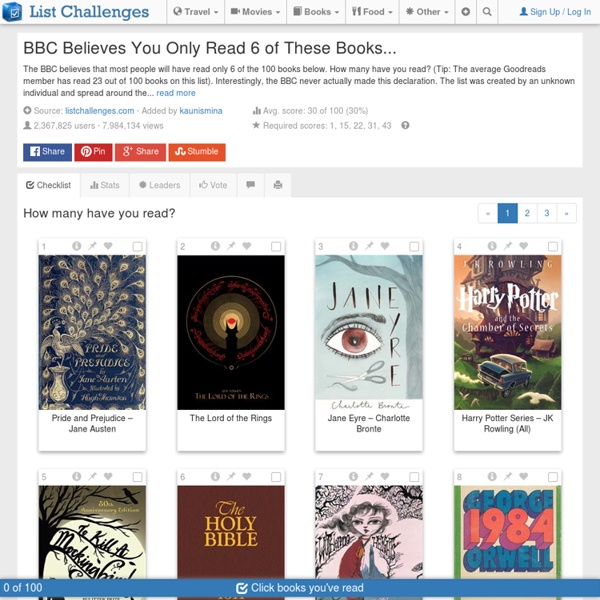



100 Exquisite Adjectives By Mark Nichol Adjectives — descriptive words that modify nouns — often come under fire for their cluttering quality, but often it’s quality, not quantity, that is the issue. Plenty of tired adjectives are available to spoil a good sentence, but when you find just the right word for the job, enrichment ensues. Practice precision when you select words. Here’s a list of adjectives: Subscribe to Receive our Articles and Exercises via Email You will improve your English in only 5 minutes per day, guaranteed! 21 Responses to “100 Exquisite Adjectives” Rebecca Fantastic list!
A List of Books | 623 of the Best Books Ever Written The FBI maintains an 83-page glossary of Internet slang. And it is hilariously, frighteningly out of touch. The FBI headquarters IRL. That’s “in real life,” to you. (Jeffrey MacMillan/Capital Business) The Internet is full of strange and bewildering neologisms, which anyone but a text-addled teen would struggle to understand. An 83-page glossary. The glossary was recently made public through a Freedom of Information request by the group MuckRock, which posted the PDF, called “Twitter shorthand,” online. All of these minor gaffes could be forgiven, however, if the glossary itself was actually good. ALOTBSOL has, for the record, been tweeted fewer than 500 times in the entire eight-year history of Twitter. Among the other head-scratching terms the FBI considers can’t-miss Internet slang: AYFKMWTS (“are you f—— kidding me with this s—?”) One would hope the people tasked with investigating federal crimes could decipher that kind of thing through context clues … but the Internet is a vast, dizzying place! Caitlin Dewey runs The Intersect blog, writing about digital and Internet culture.
15 Rare And Beautiful Words You've Never Heard Before There are 6,500 languages spoken actively today, but even that pales in comparison to the 94,000 languages that have existed through the ages. Many have died off, many are still spoken, and they’ve all created words that define really incredible things that the English language just doesn’t. Enjoy. Psychopomp. A guider of souls. Mythopoeic. Pertaining to the making of myths, or giving rise to myths. Hierosgamos. A holy marriage between a god and a goddess. Sipapu. A small tunnel or inter-dimensional passage. Oneiromancy. Divination or predicting the future through dreams. Yonic. A stylized representation of the female genitalia. In Hinduism, it is a sign of regenerative power and symbolizes the goddess Shakti. Hiraeth. A welsh word meaning homesickness for a place that never existed. Paracosm. A highly detailed world created inside someone’s mind. Petrichor. The small of the earth after it rains. Ataraxia. A state of robust tranquility from eschewing faith in an afterlife. Sambhogakaya. Chthonic. Palimpsest.
huffingtonpost.com